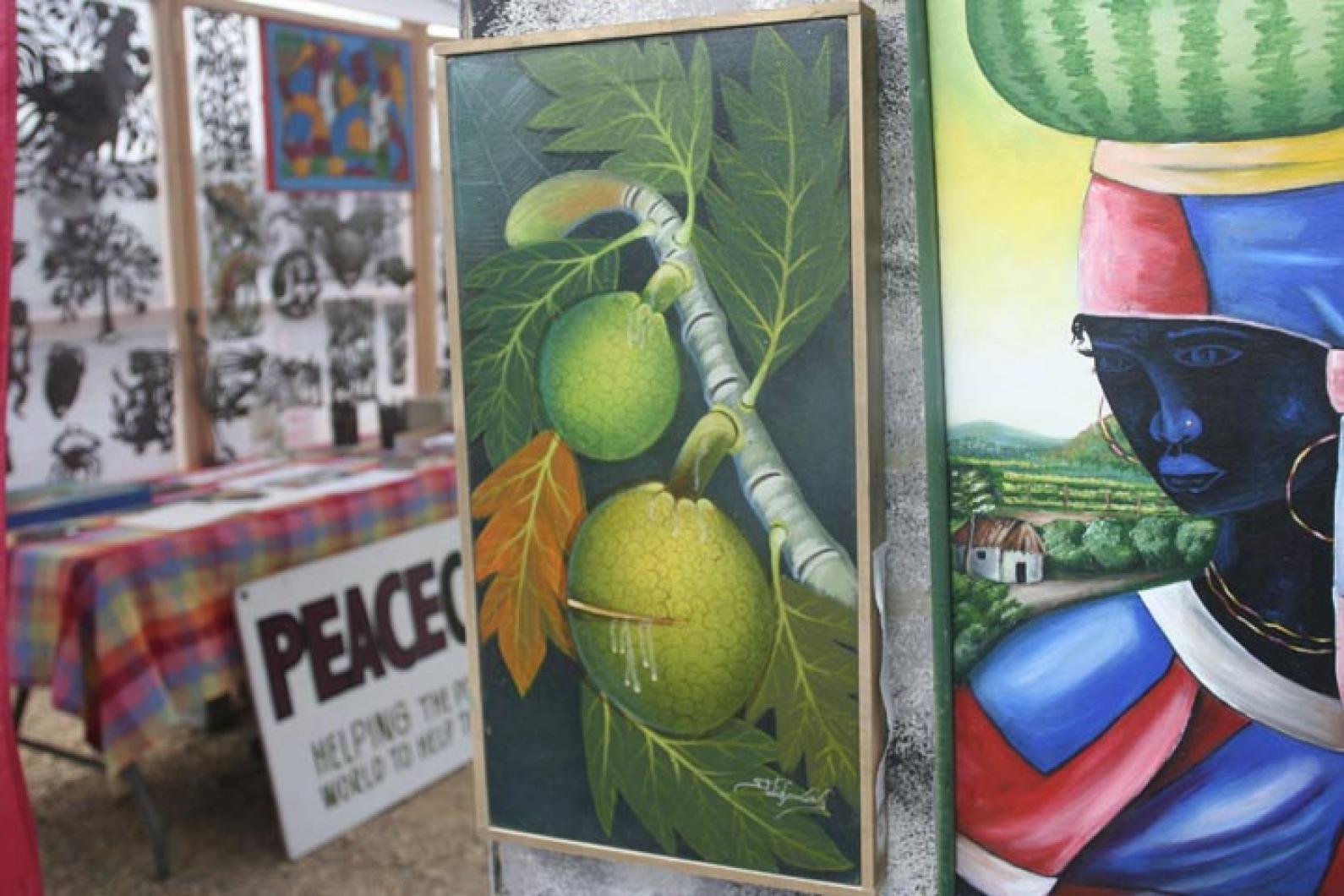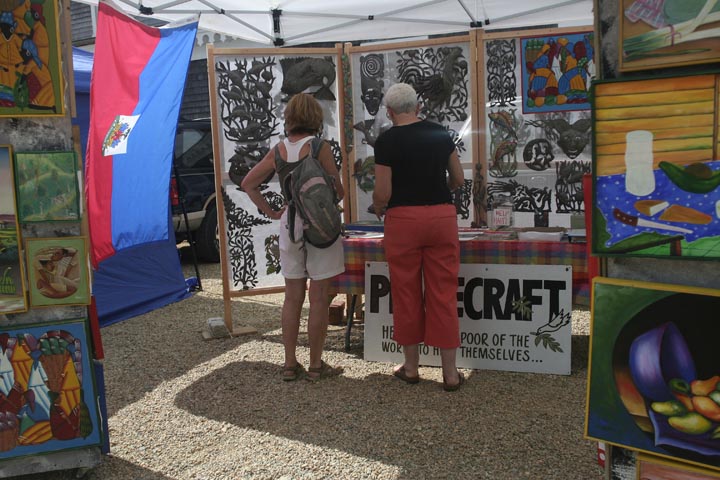Give a person a fish, feed him for a day. Teach a person to fish, feed him for a lifetime. That’s the old motto that keeps the Fish Farm for Haiti Project working every day.
The project funds a tilapia fish farm and primary school in Lilavois, Haiti, about 30 minutes outside of Port-au-Prince. There, students learn cooking, sewing, academics and now aquaculture studies, thanks to the work of Margaret Penicaud, director of the project, and other volunteers.
And after the Jan. 12 earthquake, the project’s efforts are needed even more.
“We’re trying to get protein in the diets, but also something that would be sustainable, and to teach something so other people could learn how to raise tilapia,” Mrs. Penicaud said, sitting at a table in her Vineyard Haven backyard, thumbing through photo albums of the group’s work. “That was the original idea, and then the sisters wanted to have a school, so we thought, that’s great, they could have classes in aquaculture.”
After being introduced to the leader of the order of the Daughters of Mary Queen Immaculate at St. Augustine’s Church in Vineyard Haven, all she wanted for Christmas one year was a trip to Haiti, and while her family was skeptical of her wish, Mrs. Penicaud stayed firm.
“I knew I was going,” Mrs. Penicaud said. “I got my trip and haven’t stopped since.”
In January 1998 Mrs. Penicaud made her first visit to Haiti to visit the Daughters of Mary Queen Immaculate, marking her first direct experience with third world poverty.
“It was so overwhelming, I was on my knees literally praying what can I do here,” she said. “And fish farming comes to mind, and I said to myself, what is that?”
Fish farms have become a popular alternative to breeding fish in areas that are depleted of aquaculture. By creating stable, controlled environments for fish like cod, salmon, sea bass, or in the case of the Fish Farm for Haiti Project, tilapia — fish can thrive and grow in contained pools.
“When I had this thing called fish farming come up on me out of the blue, I knew I had to follow up on that,” Mrs. Penicaud explained. “It all came together in a matter of hours.”
After visiting a nearby fish farm that had 22 fish ponds, Mrs. Penicaud was introduced to Dr. Valentin Abe. Dr. Abe is the director of the Haiti Fish Development Project, a program that won him a spot on Time Magazine’s 100 Most Important People of 2010. He was nominated by President Bill Clinton.
The sisters had two and half acres of unused land in Lilavois and Mrs. Penicaud had a passion to help.
“That same day Dr. Abe came and told us that we had enough room for six ponds and one school,” Mrs. Penicaud said. “And in that one day I had permission to start a project and that’s when we came back to the Vineyard, and said, okay friends, what can we do to raise money for the Fish Farm for Haiti Project?”
Since its first year, the project has paid for the building of the school, a small vegetable farm on the grounds, and the harvesting of 400 pounds of fish a month. It takes about four or five months for the fingerlings to reach maturity, at which point the students’ parents are either able to sell the fish at markets affordably or keep it for themselves. “Our hope was that they would get them into the diets of the children,” Mrs. Penicaud said.
Since that first visit, Mrs. Penicaud has traveled to Haiti at least once a year, but often more. She brings with her a group of volunteers that has included doctors, videographers, relatives and complete strangers. Everyone pays their own way.
On the first group visit, Mrs. Penicaud said when people pulled out cameras the children reacted hysterically because they thought the cameras were guns. “My feeling is that you have to bring people down to see it firsthand,” Mrs. Penicaud said. “They need to be moved into action.”
Carolyn Stoeber of Edgartown was one of those volunteers moved to action. After leaving her banking job on the Vineyard, Ms. Stoeber had purchased tickets to go to Haiti on the day of the earthquake. Instead, she went down with Mrs. Penicaud this past May.
“The destruction was pretty overwhelming even four months later,” Ms. Stoeber said, adding: “But it was really good to have been there and see it for myself, and make personal connections about who the earthquake affected.
“A lot of things crumbled, but not just the infrastructure, the fragile parts of the systems too.” Ms. Stoeber is organizing the July 16 clambake fundraiser, a benefit for the project.
On the day of the earthquake, cement had arrived to help build an addition to the school in Lilavois; $14,000 later, the cement was used to fix the wall that surrounded the fish farm and school compound. Half the school was left standing, but the living quarters for the sisters were destroyed.
Mrs. Penicaud said the Vineyard Transit Authority has donated a bus that should be ready in August for delivery to Haiti sometime this fall. The bus will be filled with medical supplies, instruments and equipment donated by Dr. Jason Lew, who retired this year, and turned into a clinic on wheels.
Over the years, the Fish Farm for Haiti project has held benefit concerts at the Tabernacle in Oak Bluffs, and more recently a tennis tournament at Farm Neck. Mrs. Penicaud brings back with her art by Haitian artists to sell at the Artisans’ Festival every weekend, including work by Jean-Rony Ceasar, whose paintings depict vibrant daily Haitian scenes.
But this year they decided to go bigger with the clambake, to be held at the new Agricultural Hall in West Tisbury on July 16. The event will feature a silent auction with items such as dinner for two at the Outermost Inn, a sunset cruise, tennis lessons, jewelry, painting, and ferry tickets. Tickets are $125 for the entire evening of lobster, drinks and dancing; or $30 for the auction and appetizers.
“You think of all these hundreds of thousands of Haitians living in tents and hurricane season is coming,” Mrs. Penicaud said. “We cannot stop thinking about Haiti. Let’s keep thinking about Haiti; let’s keep doing for Haiti, in solidarity with Haiti. Working together.”
The clambake benefit for Haiti begins at 5 p.m. on July 16. Tickets are available online at TicketsMV.com and at the PeaceCraft booth at the Artisans’ Festival in West Tisbury, EduComp in Vineyard Haven, Vintage Jewelry in Edgartown, Good Ship Lollipop in Oak Bluffs, and The Bite in Menemsha. Limited tickets are available at the door; advance purchase is strongly recommended.









Comments
Comment policy »